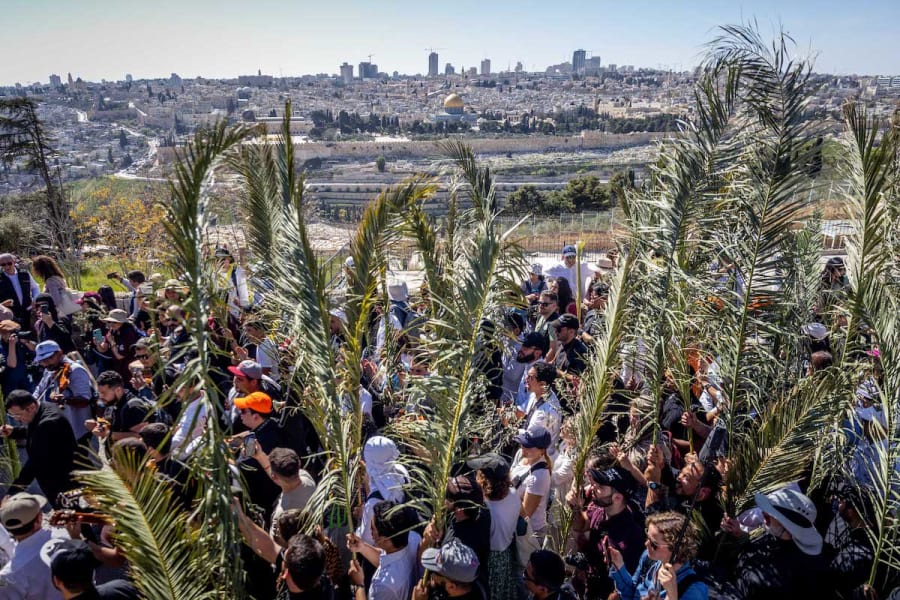Will Christian tourists begin to feel unwelcome in Israel?

When the largest global coalition of Christian groups, “slams Israel for violating religious liberties,” the tourism industry, as well as the government, should take their words to heart, because they stand to lose a lot!
In a recent strongly worded statement, the World Council of Churches claimed that they are very concerned about “the infringement on religious freedom, the denial of worship, and the constraints on the life of the Christian community in the Holy Land under the pretext of safety and security,” stating it is “unacceptable.” They have “called upon the government of Israel to allow Christian worship and community events to proceed freely and to protect the rights of religious freedom for all people.”
This unfortunate incident centered around the arrival of 3,000 individuals who were part of a Christian Orthodox community, and who made a special pilgrimage to Israel in order to participate in an assembly which was to take place on Aug.18 on Mount Tabor, commemorating the Feast of the Transfiguration.
A meeting had occurred several days prior, where the Orthodox Council in Nazareth and Israeli authorities, together, agreed to the event taking place. However, once the date arrived, the convocation was not permitted due to a last-minute determination of safety concerns, stating that “the facility could not handle such a large group.” Consequently, roads were blocked off, forcing the gathering to be canceled, while an estimated 1,000 cars waited at several checkpoints to enter.
But this was not an isolated incident, because prior to this foul up, the head of Jerusalem’s Dormition Abbey, while visiting the Western Wall Plaza earlier this summer, was told by an overseer to remove what she characterized as an inappropriate large cross that was visible over his black robe, since the area was a “Jewish place.”
In retrospect, the request seems more than odd, since no one has ever heard of a Jew having to remove his kippah (skullcap) while visiting the Vatican, a typically Roman Catholic site. In fact, if anything is “inappropriate,” it might be the refusal to recognize that tourists, of all religions and persuasions, come to visit the Western Wall. Consequently, asking a fully clothed person to adapt their mode of dress, seems to be a great overreach in the unrealistic expectation that people cannot freely enter a Jewish site while simultaneously honoring their own religious convictions.
In yet another incident in May, a group of Evangelical Christians, who arrived at the southern steps near the Wall in an attempt to pray for the peace of Jerusalem, as well as Israel’s well-being, in general, were met with great resistance by ultra-Orthodox Jews who physically attacked some attendees and accused them of being part of a missionary organization, all while shouting at them to go home.
Prior to the COVID-19 outbreak, 2.5 million Christian tourists visited the Holy Land in 2019 alone. Although that number dropped significantly because of the pandemic, there were an estimated 1.2 million Christian tourists who arrived in Israel just between January and November 2022.
These disturbing accounts do not bode well for the thousands of Christian tourists from all over the world who are scheduled to arrive in October, just a month and a half from now, in order to celebrate the annual Feast of Tabernacles event . The event is hosted by the International Christian Embassy in Jerusalem and has become a sacred pilgrimage for many among the nations who see it as a biblical injunction for the nations to come up to Jerusalem to observe the Feast of Booths (Sukkot), lest there be no rain in their land (Zechariah 14:17).
As faithful Christian tourists prepare to make the trek to the land which they also consider holy to them, will they begin to feel like unwelcome intruders who are merely being tolerated by the present ultra-Orthodox government, but who would rather they not encroach upon their Jewish space?
This kind of begrudging invitation is neither warm, embracing nor enthusiastic, and when Christian tourists, who have paid large sums of money to visit the birthplace of their Savior, are made to feel more like unwanted invaders, it is time for the government of Israel to ask itself if they are going to continue to respect the right of other faiths to freely come and pay homage to the land to which they feel so connected.
As the custodians of Israel, a place holy to so many diverse groups of religions, we cannot afford to act as an exclusive country club whose gates are only open to “our own kind” – whatever that means.
To make Christians and other faiths feel unwelcome in the Land of Promise, where it was prophesied that Abraham’s seed would bless all nations, is morally, ethically and spiritually wrong. Not only does it offend our most ardent supporters, but it has to offend the God of Israel, who commanded the nations to join themselves to us, not only during Sukkot, but in their personal search to know God, as recorded in Zechariah 8:23 – “In those days, ten men from nations of every language shall take hold of a Jew, grasping his garment, saying, “Let us go with you, for we have heard that God is with you.”
The only conclusion is that this passage must be completely unknown to those religious Jews who feel that Christian tourists pose a threat of some kind. If it is, they should consider doing a quick brush-up course on their role as the ones who are meant to reveal God’s truth to the rest of the world, because you can’t really fulfill your divine destiny if you don’t even understand the purpose for which you’ve been chosen.
Christianity and all religions must continue to be warmly welcomed to Israel, freely able to access all sites, accompanied by uninhibited worship and praise, lest we, the Jewish people, fail to carry out our intended calling as the people through whom God chose to reveal Himself to all others.

A former Jerusalem elementary and middle-school principal who made Aliyah in 1993 and became a member of Kibbutz Reim but now lives in the center of the country with her husband. She is the author of Mistake-Proof Parenting, based on the principles from the book of Proverbs - available on Amazon.














